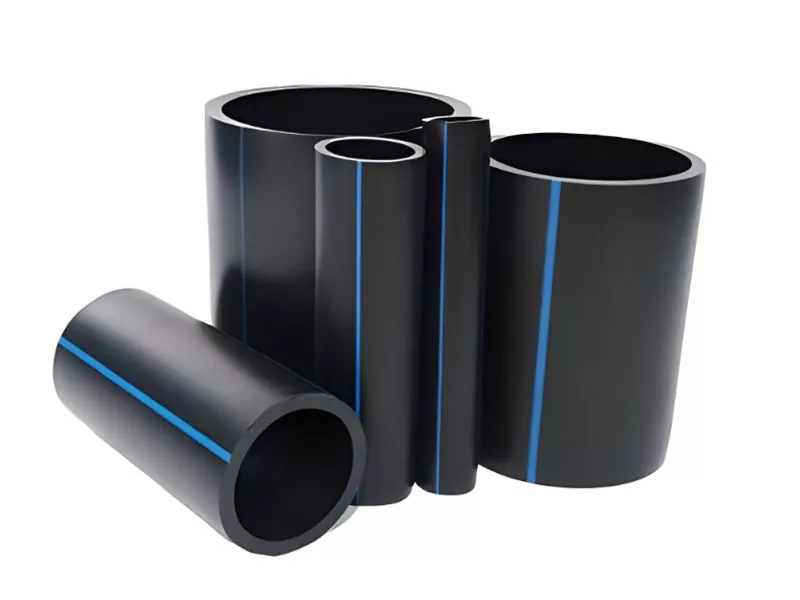Why Texas hdpe pipe manufacturer Is Leading in Advanced Pipe Solutions
Wiki Article
Understanding the Key Conveniences of HDPE Pipeline for Water and Wastewater Management
Making use of HDPE pipeline in water and wastewater monitoring provides countless advantages that merit factor to consider. Its exceptional toughness and long life expectancy make it a preferred choice for lots of jobs. In addition, the product's resistance to rust and chemical damages boosts its dependability in different environments. However, the benefits extend beyond simply longevity and resistance. Discovering its cost-effectiveness and environmental impact reveals much more engaging reasons for its widespread adoption in contemporary facilitiesOutstanding Durability and Long Life

HDPE pipeline stands out for its extraordinary durability and long life, making it a favored selection in water monitoring systems. Built from high-density polyethylene, these pipes can stand up to substantial pressure and stress and anxiety, ensuring reputable efficiency with time. Their durable nature enables them to sustain severe ecological problems, consisting of temperature fluctuations and dirt movements, which can cause various other materials to fall short.
The lifespan of HDPE pipes commonly goes beyond half a century, offering a cost-effective solution for districts and industries alike. Additionally, the material's lightweight buildings streamline installment, lowering labor prices and durations. This durability decreases the demand for frequent fixings or substitutes, further improving its economic appeal.
In water management applications, the integrity of HDPE pipelines implies fewer disturbances and improved service continuity, making them indispensable to lasting framework development. The mix of resilience and long life strengthens HDPE's function as a keystone in efficient water administration services.

Resistance to Rust and Chemical Damages
While numerous products yield to corrosion and chemical damage with time, HDPE pipes display amazing resistance, making them ideal for numerous water administration applications. This resilience originates from the molecular framework of high-density polyethylene, which is inherently non-reactive and does not wear away like steels or deteriorate from exposure to severe chemicals. Because of this, HDPE is highly reliable in atmospheres with aggressive compounds, such as wastewater systems that might have acids, bases, and natural solvents.
In addition, HDPE pipes can endure environmental elements such as soil level of acidity and saline problems, even more improving their viability for diverse applications (hdpe pipe suppliers Midland TX). Their ability to preserve architectural integrity in time lowers the risk of leaks and failings, which is crucial in making certain the safety and dependability of water circulation and wastewater management systems. The resistance to corrosion and chemical damage substantially contributes to the total effectiveness and longevity of HDPE piping services.
Cost-Effectiveness and Economic Benefits
When thinking about the monetary ramifications of water management systems, the cost-effectiveness of HDPE pipes ends up being obvious. These pipelines supply reduced installation and maintenance prices compared to conventional materials like metal or concrete. Their light-weight nature streamlines transportation and installment, leading to reduced labor expenses. Additionally, HDPE pipes show a lengthy life expectancy, commonly exceeding 50 years, which converts to fewer substitutes and long-term financial savings.Moreover, the resistance of HDPE to deterioration and chemical damage lessens the demand for costly fixings and replacements. The pipes likewise sustain effective water flow, reducing power expenses connected with pumping systems. By mitigating leakages and water loss, HDPE pipes contribute to significant financial benefits for communities and sectors alike. On the whole, the initial financial investment in HDPE piping can yield considerable financial returns over the lifespan of the water monitoring system, making it a prudent selection for lasting infrastructure growth.
Environmental Sustainability and Lowered Effect

Versatility and Adaptability in Installation
Because of their unique homes, HDPE pipes provide impressive convenience and flexibility in installment, making them suitable for a wide variety of applications. Their light-weight nature enables for simpler handling and transportation, decreasing labor expenses and setup time. HDPE pipelines can be curved and shaped to fit different surfaces and project demands, which is especially advantageous in challenging environments.Furthermore, their resistance to corrosion and chemical damage permits for installation in diverse settings without wikipedia reference the requirement for specialized safety finishings. The capacity to fuse joints develops a continuous, leak-free system, improving the general honesty and integrity of the installment. HDPE's adaptability also fits ground motion, reducing the risk of damage in areas vulnerable to changing dirt. On the whole, these characteristics make HDPE pipes not only flexible however likewise a preferred choice for water and wastewater monitoring systems.
Often Asked Concerns
Just How Does HDPE Pipeline Compare to PVC in Water Monitoring Applications?
HDPE pipe supplies remarkable versatility, resistance to rust, and resilience compared to PVC. Its lighter weight helps with simpler installation, while its lengthy life expectancy decreases replacement prices, making HDPE a recommended option in water management applications.What Is the Lifespan of HDPE Pipes Under Common Conditions?
Under common conditions, HDPE pipelines can have a life expectancy ranging from 50 to 100 years. Their sturdiness and resistance to corrosion add to their lasting performance in different applications, making them a trusted option for facilities.Are HDPE Pipeline Recyclable After Their Life Span?
Yes, HDPE pipelines are recyclable after their life span. American Plastics HDPE Pipe for Oilfield. They can be processed and repurposed into new products, substantially decreasing environmental effect and promoting sustainability within the sector, making them an environment-friendly pipe inspection option for piping servicesWhat Is the Installment Refine for HDPE Water Lines?
The installation process for HDPE pipelines includes site prep work, trenching, pipe combination or mechanical joining, backfilling, and stress testing. Correct strategies ensure a resilient and efficient system for transferring water and wastewater successfully.Can HDPE Water Lines Be Made Use Of for Both Drinkable and Non-Potable Water Systems?
Yes, HDPE pipes can be made use of for both safe and clean and non-potable water supply. Their convenience, sturdiness, and resistance to rust make them suitable for numerous applications, ensuring risk-free and reliable transportation of water in various contexts.Report this wiki page